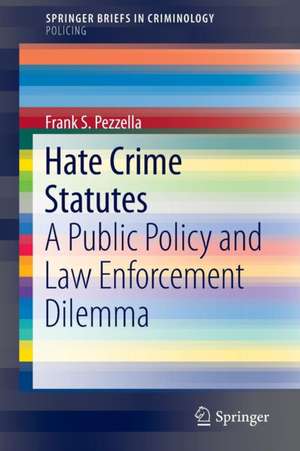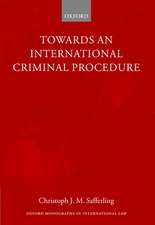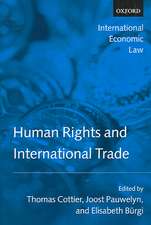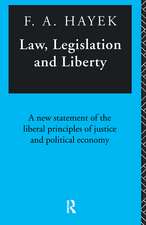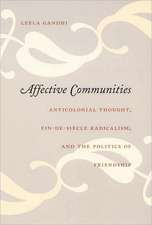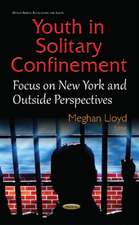Hate Crime Statutes: A Public Policy and Law Enforcement Dilemma: SpringerBriefs in Criminology
Autor Frank S. Pezzellaen Limba Engleză Paperback – 8 aug 2016
This volume begins with an introduction about defining hate crimes, and the history of hate crimes and hate crime legislation in the United States. The author shows arguments in favor of hate crime statutes, for example: hate crimes reach beyond their victims to members of the victims’ protected group and cohesion of society at large, and should therefore carry higher penalties.The author also shows arguments against hate crime statutes, for example that they sometimes contain enhanced penalties for certain specially protected groups and not others, and have a high potential for ambiguity and uneven enforcement. From a law enforcement perspective, the author explores the practical challenges in enforcing these statutes, and solutions to address them. Investigative techniques and resources vary significantly across police departments, as does training to identify and distinguish hate crimes from ordinary crimes. There is high potential for law enforcement and prosecutors’ personal biases to effect the classification of crimes as hate crimes. Law enforcement organizations are constantly faced with the dilemma of what and how to enforce legislation.
This brief will be relevant for researchers in criminology and criminal justice, policy makers involved in hate crime legislation, social justice, and police-community relations, as well as related fields such as sociology, public policy and demography.
Din seria SpringerBriefs in Criminology
-
 Preț: 356.07 lei
Preț: 356.07 lei -
 Preț: 196.15 lei
Preț: 196.15 lei -
 Preț: 175.58 lei
Preț: 175.58 lei -
 Preț: 377.57 lei
Preț: 377.57 lei -
 Preț: 374.30 lei
Preț: 374.30 lei -
 Preț: 374.30 lei
Preț: 374.30 lei -
 Preț: 374.85 lei
Preț: 374.85 lei -
 Preț: 378.12 lei
Preț: 378.12 lei -
 Preț: 445.49 lei
Preț: 445.49 lei -
 Preț: 374.85 lei
Preț: 374.85 lei -
 Preț: 380.07 lei
Preț: 380.07 lei -
 Preț: 173.25 lei
Preț: 173.25 lei -
 Preț: 378.12 lei
Preț: 378.12 lei -
 Preț: 411.93 lei
Preț: 411.93 lei -
 Preț: 378.54 lei
Preț: 378.54 lei -
 Preț: 372.08 lei
Preț: 372.08 lei -
 Preț: 375.23 lei
Preț: 375.23 lei -
 Preț: 375.45 lei
Preț: 375.45 lei -
 Preț: 375.23 lei
Preț: 375.23 lei -
 Preț: 379.09 lei
Preț: 379.09 lei -
 Preț: 375.07 lei
Preț: 375.07 lei -
 Preț: 343.72 lei
Preț: 343.72 lei -
 Preț: 409.25 lei
Preț: 409.25 lei -
 Preț: 377.35 lei
Preț: 377.35 lei -
 Preț: 376.96 lei
Preț: 376.96 lei -
 Preț: 375.07 lei
Preț: 375.07 lei -
 Preț: 378.92 lei
Preț: 378.92 lei -
 Preț: 375.07 lei
Preț: 375.07 lei -
 Preț: 377.57 lei
Preț: 377.57 lei -
 Preț: 376.59 lei
Preț: 376.59 lei -
 Preț: 355.07 lei
Preț: 355.07 lei -
 Preț: 376.43 lei
Preț: 376.43 lei -
 Preț: 376.22 lei
Preț: 376.22 lei -
 Preț: 378.71 lei
Preț: 378.71 lei -
 Preț: 352.97 lei
Preț: 352.97 lei -
 Preț: 374.46 lei
Preț: 374.46 lei -
 Preț: 374.30 lei
Preț: 374.30 lei -
 Preț: 476.79 lei
Preț: 476.79 lei -
 Preț: 376.80 lei
Preț: 376.80 lei -
 Preț: 376.43 lei
Preț: 376.43 lei -
 Preț: 475.83 lei
Preț: 475.83 lei -
 Preț: 411.54 lei
Preț: 411.54 lei -
 Preț: 478.33 lei
Preț: 478.33 lei - 15%
 Preț: 460.57 lei
Preț: 460.57 lei -
 Preț: 413.07 lei
Preț: 413.07 lei -
 Preț: 375.62 lei
Preț: 375.62 lei -
 Preț: 378.71 lei
Preț: 378.71 lei -
 Preț: 410.39 lei
Preț: 410.39 lei -
 Preț: 375.07 lei
Preț: 375.07 lei
Preț: 443.00 lei
Nou
Puncte Express: 665
Preț estimativ în valută:
84.76€ • 88.98$ • 70.36£
84.76€ • 88.98$ • 70.36£
Carte tipărită la comandă
Livrare economică 10-24 aprilie
Preluare comenzi: 021 569.72.76
Specificații
ISBN-13: 9783319408408
ISBN-10: 3319408402
Pagini: 135
Ilustrații: VII, 84 p. 2 illus. in color.
Dimensiuni: 155 x 235 x 5 mm
Greutate: 0.15 kg
Ediția:1st ed. 2017
Editura: Springer International Publishing
Colecția Springer
Seriile SpringerBriefs in Criminology, SpringerBriefs in Policing
Locul publicării:Cham, Switzerland
ISBN-10: 3319408402
Pagini: 135
Ilustrații: VII, 84 p. 2 illus. in color.
Dimensiuni: 155 x 235 x 5 mm
Greutate: 0.15 kg
Ediția:1st ed. 2017
Editura: Springer International Publishing
Colecția Springer
Seriile SpringerBriefs in Criminology, SpringerBriefs in Policing
Locul publicării:Cham, Switzerland
Cuprins
Chapter 1: Introduction.- Chapter 2: The Legacy of Hate Crimes in American History.- Chapter 3: The Case for Hate Crime Statutes-Putative Uniqueness of Injuries.- Chapter 4: Offenders, Victims and Situational Characteristics of the Hate Crime Incident .- Chapter 5: Legislative Responses to Hate Crimes.- Chapter 6: Constitutional and Public Policy Issues.- Chapter 7: The Law Enforcement and Prosecution Dilemma.- Chapter 8: Summary Discussion.
Notă biografică
Frank S. Pezzella, PhD (Criminal Justice, SUNY Albany) is an Assistant Professor of Criminal Justice at John Jay College of Criminal Justice. His research interests include Race and Crime, Hate Crimes and the influence of African American religiosity on the behavior of formerly incarcerated persons. This work was published in early 2014 in Springer’s Journal of Religion and Health under the title “Religion and the Behavioral Health of Formerly Incarcerated Men”. Prior to his current position he worked as an analyst and Deputy Chief Clerk for the NYS Unified Court System. He conducted research for legislative approval to implement community and problem solving courts. Such specialized courts such as substance abuse, domestic violence, reentry, and mental health courts are now present throughout all 62 counties in New York State. Dr. Pezzella has also worked on the expansion and institutionalization of the original Manhattan Bail Project for Vera Institute’s Pre-trial Services Agency (now the New York City Criminal Justice agency (CJA)) charged with assessing NYC defendants’ eligibility for release on recognizance under evidenced based criteria that defendants will likely to return to the jurisdiction of the court.
Caracteristici
Explores the complexities of developing hate crime legislation in the US Highlights potential pitfalls for law enforcement indentifying hate crimes Presents strategies and areas for future research in preventing hate crimes Includes supplementary material: sn.pub/extras
